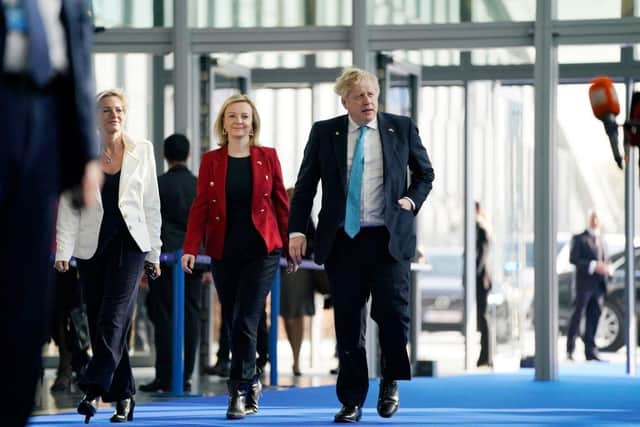Reject EU intransigence over NI Protocol changes - Brian Monteith
You will hear it said the EU has tried to negotiate a resolution but is frustrated by the failure of the UK Government to participate – but this is a disingenuous and self-serving word salad. The reality is somewhat different. Our Government has shown remarkable patience, if not uncalled for and unnecessary generosity towards the EU, by not suspending Article 16 of the Protocol – the section of the Withdrawal Agreement that allows for action to be taken by either the EU or the UK when faced with “serious economic, societal or environmental difficulties that are liable to persist, or to diversion of trade” – as is its right. Instead it is trying a different, if no less controversial, approach by introducing a Bill that will allow it to overrule certain aspects of how the Protocol operates.
Naturally, the EU, the Irish Government, nationalists and EU supporters within the UK will launch a tirade against Boris Johnson and the Foreign Secretary, Liz Truss, who is handling the Bill, but they are on weak ground. There is no doubt the Protocol is causing diversion to trade within the UK and this alone is a sufficient condition that allows the protocol to be suspended. The official trade figures of both the UK and Ireland point to trade diversions taking and individual examples of such distortions are legion.


Advertisement
Hide AdAdvertisement
Hide AdAs someone who monitors the activity, I repeatedly find new examples that, were they to exist in Scotland or the rest of the British mainland, would cause apoplexy and outrage leading to media campaigns and demonstrations.
Imagine fishing boats leaving Peterhead or Whitby or Grimsby and then not being allowed to land their legally entitled catch in their own port they had left from without having to go through considerable bureaucracy and costs that treats them as if they were from Iceland or Russia. The only reason there is no problem at the moment is because the UK Government introduced – unilaterally – a grace period, at first for six months and then extended indefinitely that disapplies the checks the EU insists upon.
Even foods going to Sainsbury supermarkets – a business that has no stores in the Republic – are subject to the EU’s over-zealous checks, designed, allegedly, to protect the EU’s internal market.
Scots should be concerned about this. There are many examples of Scottish businesses which have already stopped or are considering stopping trading with customers in Northern Ireland because of the obstacles the EU have put in place. Scottish seed potatoes cannot now be sold across the Irish Sea, nor can Christmas trees – both lucrative markets for Scottish farmers. This is a fundamental breach of the Acts of Union 1707 and 1801 that guarantees open and free trade within the United Kingdom between Scots and Northern Irish members of the UK (as well as between all of its citizens in general).
What the EU negotiator Maros Sefcovic has offered is to make minor concessions on the amount of checks on foods and goods arriving in Northern Ireland from the rest of the UK in return for the UK agreeing the Protocol becomes permanent, rather than the temporary time-limited arrangement that it was established as. That is not a negotiation – that is an attempted power-grab and politicians such as Sir Keir Starmer are falling for it.
Critics say the UK should not act unilaterally by introducing the Bill, but it was the unilateral action of the grace periods that forced the EU to agree to even meet with Lord Frost and then Liz Truss when previously they said there would be no negotiations.
Interestingly, the challenge on the powers to check goods arriving from the British mainland are currently the subject of a judicial review.
Earlier this year the Stormont Agriculture Minister, the DUP’s Edwin Poots, instructed Northern Ireland border officials to halt their customs inspections, especially on foods arriving from Great Britain on the grounds the inspections had not received the official agreement of the Stormont Executive.
Advertisement
Hide AdAdvertisement
Hide AdThis was immediately challenged in the Belfast high Court by Sinn Fein sympathisers. The inspections have meantime continued while the full hearing took place. Because EU law describing the United Kingdom was never changed to say checks should be made between “Great Britain” and “Northern Ireland” the checks that have been taking place are actually happening within the United Kingdom and not at the point the foods, goods and animals enter the EU – which is where they must happen legally according to EU law.
It was argued that legally Northern Ireland is outside the EU but aligned to its internal Market – so animals, foods and goods enter the EU only when they cross into the Irish Republic, not when they enter Northern Ireland. The UK Government was called to contradict this argument but declined to do so. We therefore have the possibility the court may rule the current checks illegal.
For the EU to have the checks it demands would mean them taking place at or behind the Irish border with the UK. Ironically, the UK has said all along it would happily provide technological solutions that would negate the need for physical checks or any hard infrastructure, thus abiding by the Belfast/Good Friday Agreement. It has always been the EU and Irish Government insisting on placing such checks at Northern Ireland ports.
A court ruling may soon overtake the need for the UK Government’s Protocol Bill – and remove the need for the current Protocol altogether.
Brian Monteith is a former member of the Scottish and European Parliaments and is editor of ThinkScotland.org
Subscribe
Subscribe at www.scotsman.com/subscriptions
Comments
Want to join the conversation? Please or to comment on this article.
